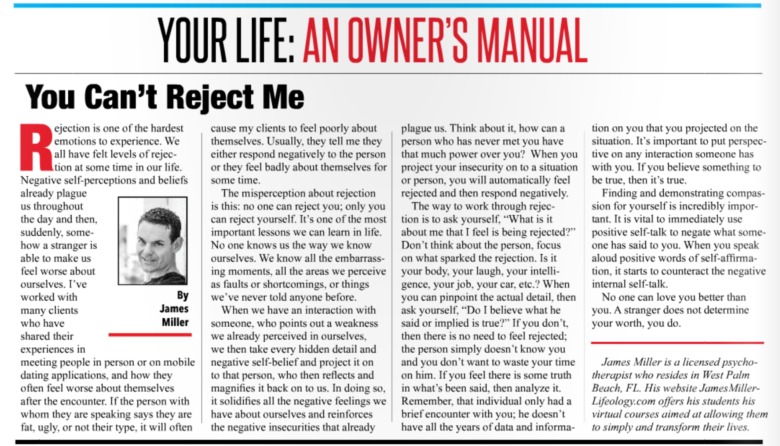Rejection is one of the hardest emotions to experience. We all have felt levels of rejection at some point in our life. Negative self-perceptions and beliefs already trouble us throughout the day, and somehow a person can make us feel worse about ourselves.
I’ve worked with many clients who have shared their experiences in meeting people in person or on mobile dating applications and how they often feel worse about themselves after the encounter. If the person they are meeting says they are fat, ugly, or not their type, it will often cause my clients to feel poorly about themselves. Usually, they tell me they react in a hostile way to the person, or they feel bad about themselves for some time.
The misperception about rejection is this: no one can reject you, but you reject yourself. It’s one of the most important lessons we can learn in life. No one knows us the way we know ourselves. We know all the embarrassing moments, all the areas we perceive as faults or shortcomings, or things we’ve never told anyone before. When we have an interaction with someone, who points out a flaw we already think we have, we then take that information and run with it. We analyze every area of our past that only we know, and take our negative self-belief, and project it on to that person. That person then reflects and magnifies what we are thinking back to us. We then believe we have been rejected. In doing this, it solidifies all the negative feelings we have about ourselves and reinforces the negative insecurities that already torment us.
Think about the above example, how can a person who has never met you have that much power over you? Sure, you both may have different body types you find attractive, but it should in no way devalue you or reflect on your self-worth. When you project your insecurity on a situation or person, you will automatically feel rejected and then respond negatively.
The way to work through rejection is to ask yourself, “What is it about me that I feel is being rejected?” Don’t think about the person, focus on what sparked the rejection. Is it your body, your laugh, your intelligence, your job, your car, etc.? When you can pinpoint the exact detail, then ask yourself, “Do I believe what he said or implied is true?” If you don’t, then there is no need to feel rejected; the person simply doesn’t know you, and you don’t want to waste your time on him. If what he says, you think there is some truth to it, then analyze it. Remember, that individual only had a brief encounter with you; he doesn’t have all the years of data and information about you that you projected on that meeting.
It’s essential to find perspective on any interaction. You do this by asking yourself how well do you know someone and how much intimate knowledge they have about you. If you believe something to be true, then it’s true.
Finding and demonstrating compassion for yourself is incredibly important. It is vital to immediately use positive self-talk to negate what someone has said to you. When you speak aloud positive words of self-affirmation, it starts to counteract the negative internal self-talk that this person caused. It then helps you defuse your hurt and rejected feelings.
No one can love you better than you. Another does not determine your worth, you do.


 We all get overwhelmed and sometimes don’t know what to do. LIFE LESSONS is your new “go-to” book to help you navigate life.
We all get overwhelmed and sometimes don’t know what to do. LIFE LESSONS is your new “go-to” book to help you navigate life.